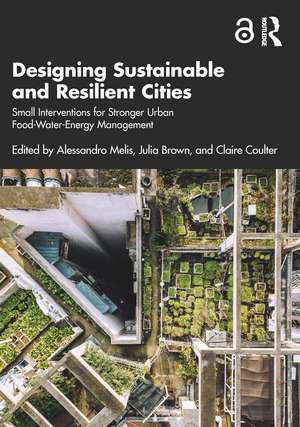Designing Sustainable and Resilient Cities: Small Interventions for Stronger Urban Food-Water-Energy Management
Editat de Alessandro Melis, Julia Brown, Claire Coulteren Limba Engleză Paperback – 27 iul 2022
The book presents contributions from CRUNCH, a transdisciplinary team of scholars and practitioners whose expertise spans urban climate modelling; food, water, and energy management; the design of resilient public space; collecting better urban data; and the development of smart city technology. Whilst previous works on the Food-Water-Energy nexus have focused on large, transnational cases, this book explores local ways to use the Food-Water-Energy nexus to improve urban resilience. It suggests tangible ways in which the cities and communities around us can become both more efficient and more climate resilient through small changes to their existing infrastructure.
Over half of the world’s population lives in urban areas, and this is expected to increase to 68% by 2050. We urgently need to make our cities more resilient. This book provides a planning tool for decision-making and concludes with policy recommendations, making it relevant to a range of audiences including urbanists, environmentalists, architects, urban designers, and city planners, as well as students and scholars interested in alternative approaches to sustainability and resilience.
Chapter 2 of this book is freely available as a downloadable Open Access PDF at http://www.taylorfrancis.com under a Creative Commons Attribution-Non Commercial-No Derivatives (CC-BY-NC-ND) 4.0 license.
| Toate formatele și edițiile | Preț | Express |
|---|---|---|
| Paperback (1) | 338.81 lei 6-8 săpt. | |
| Taylor & Francis – 27 iul 2022 | 338.81 lei 6-8 săpt. | |
| Hardback (1) | 1000.27 lei 6-8 săpt. | |
| Taylor & Francis – 27 iul 2022 | 1000.27 lei 6-8 săpt. |
Preț: 338.81 lei
Nou
Puncte Express: 508
Preț estimativ în valută:
64.84€ • 70.41$ • 54.46£
64.84€ • 70.41$ • 54.46£
Carte tipărită la comandă
Livrare economică 23 aprilie-07 mai
Preluare comenzi: 021 569.72.76
Specificații
ISBN-13: 9780367631970
ISBN-10: 0367631970
Pagini: 218
Ilustrații: 6 Tables, black and white; 4 Line drawings, black and white; 34 Halftones, black and white; 38 Illustrations, black and white
Dimensiuni: 174 x 246 x 12 mm
Greutate: 0.35 kg
Ediția:1
Editura: Taylor & Francis
Colecția Routledge
Locul publicării:Oxford, United Kingdom
ISBN-10: 0367631970
Pagini: 218
Ilustrații: 6 Tables, black and white; 4 Line drawings, black and white; 34 Halftones, black and white; 38 Illustrations, black and white
Dimensiuni: 174 x 246 x 12 mm
Greutate: 0.35 kg
Ediția:1
Editura: Taylor & Francis
Colecția Routledge
Locul publicării:Oxford, United Kingdom
Public țintă
Postgraduate, Professional, and Professional Practice & DevelopmentCuprins
Preface Steffen Lehmann, Introduction Julia Brown, Claire Coulter, and Alessandro Melis, PART 1: Urban Living Laboratories, 1.0 Introducing the CRUNCH Urban Living Labs Claire Coulter, 1.1 Eindhoven: Brainport Smart District: A circular economy experiment Maryam Ghodsvali, Gamze Dane, and Bauke de Vries, 1.2 Gdańsk: Urban Initiative Laboratory Joanna Bach-Glowinska, Karolina Krośnicka, Jacek Łubiński, and Joanna Tobolewicz, 1.3 Miami: Data-driven planning and scenario tools Thomas Spiegelhalter, 1.4 Southend-on-Sea: Green infrastructure for climate resilience Claire Coulter, 1.5 Taipei: Sustainable management for wastescapes: A Food-Water-Energy nexus experiment Mei- Hua Yuan, Pei-Te Chiueh, Yu-Sen Chang, Hsin-hsin Tung, Chnag-Ping Yu, Hwong-wen Ma, Shang-Lien Lo, 1.6 Uppsala: Groundwater management in the neighbourhood of Rosendal Vera van Zoest, Edith Ngai, Shashank Shekher Tripathi, and Archit Suryawanshi, PART 2: Food-Water-Energy nexus findings, 2. The urban living lab as an adaptive governance mechanism for the transdisciplinary Food-Water-Energy nexus: Lessons learned from six local contexts Maryam Ghodsvali, Gamze Dane, and Bauke de Vries, 3. Urban greening snakes and ladders: A case study of the practical realities of implementing Food-Water-Energy nexus projects in Southend-on-Sea, UK Heather Rumble and Julia Brown, 4. Capacity: Transforming challenges into opportunities Joanna Bach-Głowińska, Jacek Łubinski, and Joanna Tobolewicz, 5. Data and knowledge supporting decision-making for the urban Food-Water-Energy nexus Mei- Hua Yuan, Joanna Bach-Głowińska, Pei-Te Chiueh, Yu-Sen Chang, Hsin-hsin Tung, Chnag-Ping Yu, Hwong-wen Ma, Jacek Łubiński, Shang-Lien Lo, 6. Development of an integrated decision support system (IDSS) Vera van Zoest, Edith Ngai, Shashank Shekher Tripathi, and Archit Suryawanshi, 7. Genetic Water-Energy-Food nexus design research for Miami’s Greater Islands: Climate Resilient Urban Nexus CHoices (CRUNCH) – scripting and coding AI-M’s Thomas Spiegelhalter, Levente Juhasz, and Srikanth Namuduri, 8. The role of Digital Twins in the CRUNCH project Chris Cooper and Claire Coulter, Conclusions Julia Brown, Claire Coulter, and Alessandro Melis
Notă biografică
Alessandro Melis is an Italian architect and the curator of the Italian National Pavilion at the 17th Venice Biennale of Architecture. He is a Professor of Architecture and the inaugural IDC Foundation Endowed Chair of New York Institute of Technology.
Julia Brown is a qualitative human geographer and Senior Lecturer in Environment and Development, Department of Geography at the University of Portsmouth, UK, with a particular focus on sustainable rural water resource management in Sub-Saharan Africa.
Claire Coulter is a Teaching Fellow in the Operations and Systems Management Group at the University of Portsmouth, UK. She was the Project Coordinator for CRUNCH and her research explores strategies for encouraging environmentally sustainable behaviour in urban SMEs.
Julia Brown is a qualitative human geographer and Senior Lecturer in Environment and Development, Department of Geography at the University of Portsmouth, UK, with a particular focus on sustainable rural water resource management in Sub-Saharan Africa.
Claire Coulter is a Teaching Fellow in the Operations and Systems Management Group at the University of Portsmouth, UK. She was the Project Coordinator for CRUNCH and her research explores strategies for encouraging environmentally sustainable behaviour in urban SMEs.
Descriere
This book explores the link between the food-water-energy nexus and sustainability, and the extraordinary value that small tweaks to this nexus can achieve for more resilient cities and communities. It provides a planning tool for decision making and concludes with policy recommendations, making it relevant to a range of audiences.
